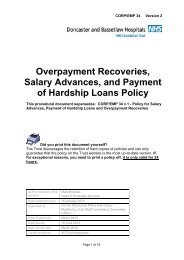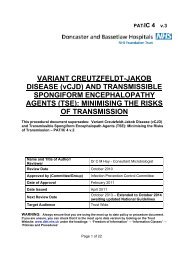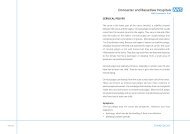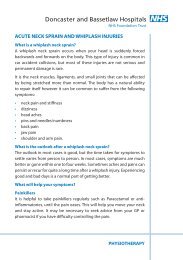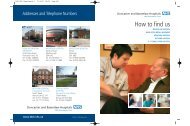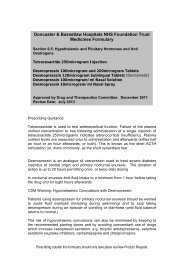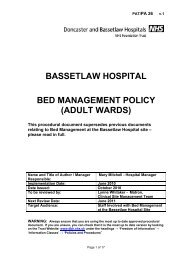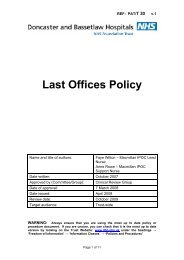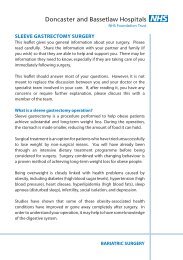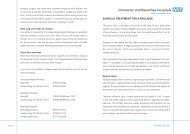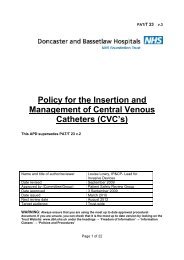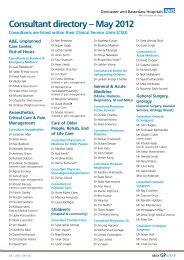evidence based mouth care policy - Doncaster and Bassetlaw ...
evidence based mouth care policy - Doncaster and Bassetlaw ...
evidence based mouth care policy - Doncaster and Bassetlaw ...
Create successful ePaper yourself
Turn your PDF publications into a flip-book with our unique Google optimized e-Paper software.
• STAFF WHO MAY CARRY OUT THE PROCEDURE<br />
The <strong>mouth</strong> <strong>care</strong> needs of patients are identified on an individual basis.<br />
Page 4 of 21<br />
REF: PAT/PA 17 v.1<br />
Student nurses <strong>and</strong> midwives may deliver oral <strong>care</strong> to patients only under the supervision of a<br />
registered nurse or midwife who are competent in this aspect of <strong>care</strong> <strong>and</strong> the supervisory role.<br />
A registered nurse or midwife must carry out the oral assessment whilst health <strong>care</strong> assistants <strong>and</strong><br />
clinical support workers may carry out oral <strong>care</strong>, under supervision.<br />
It is the responsibility of the RGN <strong>and</strong> Registered Midwife to assess, plan, implement <strong>and</strong> evaluate<br />
<strong>care</strong>.<br />
In line with guidelines laid down by the NMC (2002) for records <strong>and</strong> record keeping there must be a<br />
current <strong>and</strong> appropriate plan of <strong>care</strong> for all patients. The plan must incorporate on-going evaluation<br />
<strong>and</strong> reassessment of <strong>care</strong> <strong>and</strong> <strong>evidence</strong> that relevant interventions <strong>and</strong> observations have been<br />
communicated to appropriate members of the multidisciplinary team.<br />
Student nurses/midwives, health <strong>care</strong> assistants <strong>and</strong> clinical support workers should work through<br />
the <strong>mouth</strong> <strong>care</strong> pack produced by the Oral Health Working Party (OHWP 2003). This pack is<br />
available from the Training <strong>and</strong> Development Department upon request.<br />
The following risk factors should be taken into account:<br />
• RISK FACTORS<br />
Illnesses<br />
The literature consistently supports that various illnesses increase an individual’s risk of oral<br />
complications.<br />
* Diabetes * limited/restricted fluids<br />
* thyroid dysfunction * <strong>mouth</strong> breathers<br />
* oral disease/trauma * confusion<br />
* cerebrovascular disease * depression<br />
* debility * terminal illness<br />
* acute/chronic breathing * poor nutritional status<br />
disorders * oxygen therapy<br />
* insufficient saliva production * a general lack of motivation or inability<br />
to undertake oral hygiene<br />
(Thurgood 1994, Regnard et al 1997, Holmes 1997).<br />
• Other patients groups ‘at risk’<br />
i) Patient receiving intensive <strong>care</strong><br />
ii) Patients receiving chemotherapy <strong>and</strong> patients receiving radiotherapy to the head <strong>and</strong><br />
neck.<br />
iii) Patients receiving immunosuppressive therapy, i.e. transplant patients. (White 2000)<br />
iv) Elderly patients – if ill fitting, then dentures should be avoided where possible. If well<br />
fitting then dentures should be cleaned twelve hourly <strong>and</strong> removed at night. They<br />
should be brushed with an unperfumed soap or toothpaste, soaked in a solution of<br />
sodium hypocloride (Milton Sol, Denture Steradent for metal dentures) for 30 minutes<br />
<strong>and</strong> stored dry overnight.



